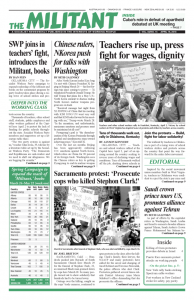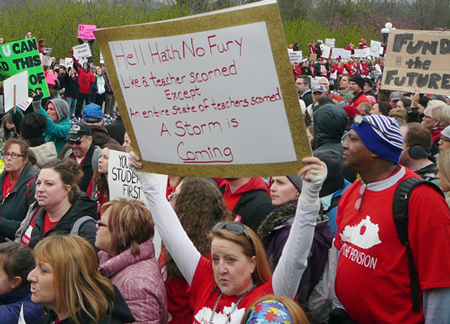OKLAHOMA CITY — Teachers and school workers rallied at the Capitol here April 2, part of an uprising around the country seeking to reverse years of declining wages and conditions. Tens of thousands walked off the job, shutting down schools in more than 200 districts across the state. They came to demand the legislature raise their wages and increase funding for schools.
“We’re not going to take it anymore!” read the banner teachers from Northeast Academy carried.
“I have taught for over 10 years and live from paycheck to paycheck,” one sixth-grade teacher from a rural school told the Militant. “We will be out for as long as it takes.”
“It’s like the Arab spring, but it’s a teachers’ spring,” geography teacher Toni Henson told the press at the rally.
Buses from throughout the state and shuttles from nearby parking lots began dropping off participants as early as 7 a.m. They marched around the Capitol and mingled on the grounds for several hours before the rally began. The crowd grew so large you couldn’t move. The Tulsa World reports 25,000 “marched on and through the Capitol.” Thousands of homemade signs graphically expressed workers’ opinions about their working and living conditions.
The teachers were outraged at the abusive conditions they and their students face.
“We have 30 kids in a classroom,” said Angie Gibson, who has taught for 24 years. She traveled here with a group of teachers who work at Briggs, a rural elementary school near Tahlequah. They described how families there face similar difficulties imposed by the crisis of capitalism today. They said they’ve volunteered to buy shoes and coats for the kids and plan to stay here for the whole week.
When it was clear the protests would continue the next day, many school districts closed throughout the state. Thousands returned to the Capitol. Then school districts were closed April 4 for a third straight day. Hundreds gathered inside the Capitol where the legislature was in session, chanting, “Fund our schools” and “We’re not leaving.”
The legislature and Gov. Mary Fallon tried to defuse the teachers’ anger and stave off the walkout at the last minute. On March 28, after months of claiming there was no money for raises, legislators passed and Fallon signed a bill increasing annual wages for teachers by an average of $6,100, for staff by $1,250 and adding $50 million to school funding. This fell short of the demands by the teachers union, the Oklahoma Education Association. Fallon’s efforts failed to prevent teachers from walking out.
The bill also imposed new taxes that will hit working people the hardest, including on gas and tobacco.
Many teachers at the April 2 rally supported some tax increases, saying they couldn’t see how else needed changes could be paid for. But Bill Ray, who teaches at Douglass High School here, told the Militant, “We need to look at the way we rely too much on revenue from taxes. This will hurt teachers and workers.” Others favored putting the cost onto the gas and oil bosses, the biggest industry in the state.
School closures continue
Rallies were held across the state the following day, leading more school districts to announce suspension of classes.
Many strikers are fed up with politicians. Frederick Smitherman, an eighth-grade teacher, joined a protest in Tulsa. “We all pay taxes and expect our legislators to do what we voted them in to do,” he told Reuters. “What else are teachers supposed to do besides yell and scream? We can vote them out, but voting one out just brings a bad one in instead.”
On the third day of the walkout, a group of school workers, parents and other supporters in Tulsa started a seven-day, 100-mile march to the Capitol. The Tulsa superintendent, the vice president of the Oklahoma teachers union and the National Education Association secretary treasurer are participating.
Solidarity and support for the school workers’ fight has been a prominent feature across Oklahoma, as in other states. The weight of the sizable Native American population in Oklahoma was registered when the National Indian Education Association based in Washington, D.C., issued a statement of support.
Justin Evans, a heavy equipment operator from Tulsa, attended the April 2 rally. He is president of International Union of Operating Engineers Local 627. “There were some crane operators who shut their jobs down today to be here. I heard some ironworkers did the same,” he said.
Dezrea Dalessandro, a 29-year-old member of the National Association of Social Workers, joined the rally. “We face similar conditions,” she said. “When I became a social worker I thought I would be able to help people. But it is impossible.”
Going door to door to discuss the fight and introduce the party in nearby Purcell, members of the Socialist Workers Party met Sherraina Walden, who said she works four jobs.
“I’m a tutor, a child care worker, house sitter and a clerk in a store, and I still can’t get by,” she said. “My husband worked for Walmart. That’s why he’s got problems with his knees and back. I’m with the teachers. My son is autistic, there are 29 kids in his special needs class.”
Kentucky teachers fight attacks on pensions
FRANKFORT, Ky. — “Don’t make me go West Virginia on you,” read a number of signs at the April 2 rally of teachers and other school workers outside the state Capitol here.
Courtney Watson, a teacher from Louisville, was one of thousands gathered to protest the attacks on pensions and funding for schools throughout the state. The social movement school workers in West Virginia built during their nine-day walkout provided an example to emulate for many here.
“What impressed me about their strike was how they gathered beforehand to provide for those kids,” Watson said.
In addition to teachers, bus drivers, custodians, librarians and other school workers, a lot of high school students and younger children joined the action, organized by the Kentucky Education Association. All Kentucky’s counties were represented, reflected in the popular chant, “120 strong.”
‘Pension reform’ part of sewage bill
On March 29 the state legislature passed a “pension reform” bill tacked onto a sewage bill. It ends regular pensions for new teachers, instead tying their retirement to capitalist market returns on a 401(k)-type account. Teachers in Kentucky aren’t eligible for Social Security, so they depend entirely on their pensions.
Teachers have staged several rallies in their hundreds and thousands protesting the pension proposal. The union ranks responded immediately after the bill was adopted.
“That night a bunch of us decided to sick out,” Caroline Wilkerson, a second-grade teacher in Jessamine County, told the Militant at the April 2 rally. So many called off that officials cancelled school there and in some 20 other counties. The next day “we rallied here in the morning, and then went back to protest at the Jessamine County Courthouse,” she said.
“I made this sign with scented markers because your Sewage Bill stinks!” read Katie O’Daniel’s sign. She teaches English as a second language at Oldham County High School. She came with her school-age children. “Every week 12.5 percent is taken out of our checks towards our pension. When we’re low on cash we can’t use it, but the state can use it,” for other things.
Nearly all schools statewide were closed for the start of spring break. Some 21 districts that were not on break were closed because workers took off to join the protest at the Capitol.
O’Daniel said that this week teachers in her district packed extra lunches for the kids, since school would be closed. They often do this for holidays, and usually it’s the teachers who deliver them in their own vehicles to students’ homes. Sometimes there are local pickup areas.
The rally took place as the legislature debated a budget proposal that includes many cuts to education funding. Teresa Wren, a school bus driver in Madison County, said there is talk of cutting $2 million from school transportation funds for her district alone. If that happens, “they’ll start by cutting field trips,” she said. “After paying taxes and insurance we take home barely minimum wage unless we can drive those extra trips.”
The proposal also includes a tax increase on cigarettes and puts taxes on car repairs, veterinary services for small animals — your cats and dogs — and a service tax on gyms.
Other unionists picked up by the determination of the teachers to resist the attacks came to the rally to show their support. This included members of the Teamsters and United Food and Commercial Workers. “This same administration attacked us, repealing the prevailing wage law and passing ‘right to work’” last year, said Doug Conley, business agent for Plumbers and Pipefitters Local 452.
Gov. Matt Bevin just signed another anti-labor law that weakens workers’ compensation protections. Among other things, House Bill 2 places new obstacles to coal miners receiving state compensation for black lung disease. And on March 27 the legislature adopted a bill that would ban a common abortion procedure after the 11th week of pregnancy.
Arizona teachers rally, demand 20 percent raise
PHOENIX — The crowd chanted “20 percent!” when Noah Karvelis of Arizona Educators United announced the raise Arizona teachers are demanding from the podium of a teachers’ rally here, March 28.
A month of actions included a sickout on March 21 by teachers in Pendergast Elementary School District, forcing the closure of nine schools.
Teachers got a 1 percent raise this year and will get another 1 percent next year. Gov. Doug Ducey has rejected the teachers’ demands.
Karvelis told the rally that if legislators do nothing to meet their demands before the legislative session closes April 17 workers will step up their actions.


